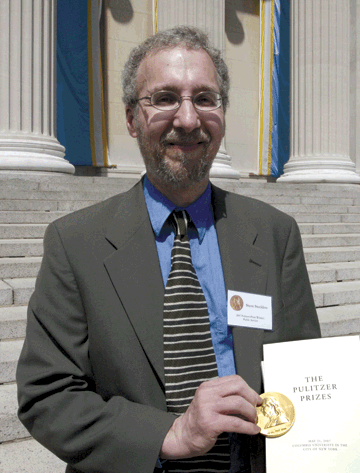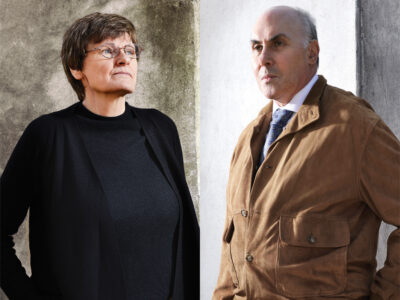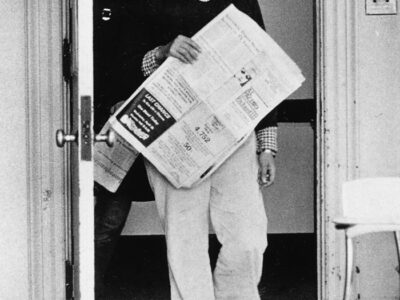
Class of ’76 | Steve Stecklow C’76 has won his fair share of journalistic awards since he graduated from The Daily Pennsylvanian more than three decades ago. There was the George Polk Award in 1988 (for coverage of the Iran-Contra scandal with a team of Knight-Ridder reporters); the grand prize in the 1996 Benjamin Fine Awards (for education reporting with
The Wall Street Journal, where he has worked since 1993); and the Elizabeth Neuffer Award for Print Journalism (in 2004, for a series on the United Nations with a group of other Journal reporters)—to name just a few.
But although he and a colleague were finalists for a Pulitzer Prize in 2003 for their series on corruption in the U.N.’s oil-for-food program, Stecklow—whose job title is senior special writer and news editor in the Journal’s Boston bureau—still hadn’t won the big one. That changed this past April, when he and three Journal colleagues earned a Pulitzer for public service for their series on backdated stock options for corporate CEOs. The four reporters uncovered a widespread practice of backdating a CEO’s stock options to a date preceding a rise in the company’s stock; in one case, they determined that the odds of a CEO’s stock-option grants always preceeding a rise in the stock price were one in 300 billion. The series resulted in at least 70 top executives losing their jobs, and the investigations are still under way.
Stecklow, whose contributions included a report from Namibia, where he tracked down former Comverse Technology CEO Jacob “Kobi” Alexander (who had fled there rather than discuss his own backdated stock options with federal prosecutors), recently spoke by email with Gazette senior editor Samuel Hughes.
What prompted the series?
Mark Maremont, an editor and reporter in the Boston office, wrote a story in November 2005 about some academics who theorized that some companies were backdating stock options. But the researchers didn’t identify any companies. Mark convinced them to share some of the data; he began working with two reporters—Charles Forelle and James Bandler—to try to identify some of the companies. That’s how it got started. Their first story appeared in March 2006. I was first brought in May 2006.
I gather you were brought into the project in May to “humanize” the stories. Why was that, and how did you go about doing so?
As terrific as the first stories were, they were very statistical in nature. There was a feeling by some top editors that we also needed to write about people. So I set out to reconstruct a company that had engaged in backdating and tell the behind-the-scenes story of how employees carried it out. I did that with a Silicon Valley company.
Various people have compared the practice of backdating stock options with betting on a horse race after the race is over. How ironic is it that these executives, who presumably champion the free market, would do something like that?
It’s very ironic. But a lot of them were well aware of what they were doing and seemed to think it was okay because a lot of other companies also were doing it. Until the first criminal charges last summer, there wasn’t much of a downside.
Were you surprised at the extent of the practice?
We all were, I think. My colleagues’ first story only named six companies in which the timing of their option grants seemed very unlikely. At the moment, more than 140 companies are under federal investigation.
What was the reaction to this scandal on the WSJ editorial board?
One columnist on the editorial page repeatedly attacked media stories on backdating, suggesting that the scandal was being overblown.
How many stories in the series did you work on, and which were your favorites?
I worked on or helped to edit quite a few backdating stories, including most of the ones about Apple Inc. and Steve Jobs. Two long front-page stories I wrote were included in the Pulitzer package. My favorite was the Namibia story. Even though it was a lot easier to do than the reconstruction, I love to report from overseas and particularly enjoy landing in a foreign country and jumping on a story. (I spent seven years as a London-based foreign correspondent for the Journal, from 1998 to 2005.)
Why did you follow Kobi Alexander to Namibia? Were you disappointed you couldn’t interview him there?
I followed Kobi Alexander to Namibia because I had been reading about how he was living in the open there, even though he was a fugitive. So I thought that would make an intriguing human-interest story. I assumed he wouldn’t talk to me, and he didn’t. But I quickly was able to follow his tracks in Namibia, interviewing everyone from the manager of the hotel where his family first stayed, to Namibia’s sole rabbi, who had tried to bring him kosher food when he was briefly jailed.
For someone who was there to humanize the stories, you also had to deal with some complicated financial shenanigans. Was that a challenge?
Although I’ve never considered myself a real financial journalist (I got my start writing a humor column for The Daily Pennsylvanian), I’ve done a lot of follow-the-money stories over the years, and this wasn’t all that different. It really came down to finding former employees and convincing them to talk; I’ve had to do that countless times before. Plus, after 14 years at the Journal, I’ve learned a few things about business. And the things I don’t know, I have colleagues I can ask.
What was it like working on a four-man team?
I greatly enjoy working with colleagues, including math whizzes like Charles Forelle. During my seven years at the Journal as a foreign correspondent I did so many joint ventures with other reporters, I used to joke that my editors probably thought that I wasn’t capable of doing a story by myself.
What sort of impact has the series had on corporate America?
I’d like to think it would make executives think twice before they try something like backdating again. In addition, the stories proved quite lucrative for a lot of lawyers.
You’ve won your share of awards. How does this compare?
The Pulitzer definitely is different. People are a lot more impressed by it. I’m not sure my contribution to these stories was superior to some of my previous work. But it’s something I’ve never won before and it’s very gratifying to have done it.
What’s especially nice is you get to hear from people you haven’t heard from in years. That, and you get to drink a lot of good champagne.




